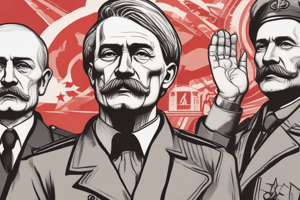Podcast
Questions and Answers
What year was The Communist Manifesto written?
What year was The Communist Manifesto written?
- 1776
- 1968
- 1848 (correct)
- 1905
Marx was well known during his lifetime.
Marx was well known during his lifetime.
False (B)
What are the two groups that societies are divided into, according to Marx?
What are the two groups that societies are divided into, according to Marx?
Owners and Workers
According to Marx, owners exploit ______.
According to Marx, owners exploit ______.
What was one predicted outcome of the class struggle?
What was one predicted outcome of the class struggle?
What is Marxism primarily a way of understanding?
What is Marxism primarily a way of understanding?
Marx believed the predicted revolution occurred as he stated.
Marx believed the predicted revolution occurred as he stated.
According to Marx, what weighs like a nightmare on the brain of the living?
According to Marx, what weighs like a nightmare on the brain of the living?
Which statement reflects Marx's view on history?
Which statement reflects Marx's view on history?
Match the following terms with their definitions:
Match the following terms with their definitions:
Flashcards are hidden until you start studying
Study Notes
Karl Marx and Marxism
- Marx was a prominent figure in the development of communist ideology and political philosophy.
- Co-authored The Communist Manifesto in 1848 with Friedrich Engels.
- Writings of Marx fall into three categories: journalism, political polemic, and societal analysis.
Understanding Communism and Marxism
- Communism advocates for equal rights to wealth among all individuals.
- Marxism serves as a framework for analyzing societal organization, structure, and evolution.
Impact and Legacy
- During his lifetime, Marx was relatively unknown outside revolutionary groups.
- After his death, his works inspired political revolutions, though many resulted in totalitarian regimes.
- Marx’s philosophy significantly influenced various political parties, such as the Labour Party in the UK.
Conflict Theory
- Society is fundamentally divided into two primary groups: owners and workers.
- Capitalist societies categorize these groups as bourgeoisie (owners) and proletarians (workers).
- Central tenet: owners exploit workers, generating profit from their labor.
Marx's Historical View
- Marx viewed history as a record of class struggles, encapsulated in the claim that “the history of all hitherto existing society is the history of class struggle.”
- Workers tolerate their exploitation due to systemic oppression and indoctrination by ideology and religion.
Marx's Critique of Labor
- Workers become poorer as they produce more wealth; their labor increases the power and reach of capital, not their own well-being.
- Marx stressed the disempowerment of the worker within capitalist structures.
Predictions of Revolution
- Marx predicted increasing wealth concentration among a small elite.
- He forecasted a revolutionary uprising led by workers against the bourgeoisie, beginning in Britain.
- Such a revolution was anticipated to occur imminently but did not materialize as predicted.
Reflections on Historical Dynamics
- Marx believed individuals shape their own history, albeit within constraints imposed by previous generations.
- He famously posited that history repeats itself, first in tragedy, then in farce.
Critique of Bourgeois Society
- In capitalist societies, capital possesses independence and individual identity, while the worker is subjugated and lacks individuality.
Conclusion of Marxism
- Marxism offers a political philosophy for evaluating social relationships but does not mandate personal views.
- Acknowledging its strengths and weaknesses is essential for understanding its role in contemporary culture.
Studying That Suits You
Use AI to generate personalized quizzes and flashcards to suit your learning preferences.





